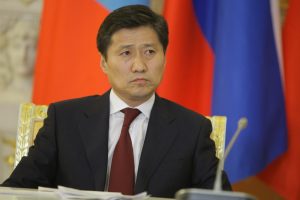On March 26, prosecutors with the U.S. Eastern District of New York announced that the United States was seeking forfeiture of a “former Mongolian prime minister’s luxury New York City apartments purchased with proceeds of corruption scheme.” According to the press release from the Department of Justice (DoJ), the case concerns former Mongolian Prime Minister Batbold Sukhbaatar’s two luxury apartment units in New York, purchased for $14 million. The release further elaborates on suspected embezzlement, money laundering schemes, and using illegal funds for personal use within the United States.
“The apartments were purchased, in whole or in part, with the proceeds of unlawfully awarded Mongolian mining contracts, at the direction and for the benefit of then-Mongolian Prime Minister Sukhbaatar Batbold and his family,” the DoJ claimed.
Batbold, who is currently an elected member of the Parliament of Mongolia, served as prime minister of Mongolia from 2009-2012 during Elbegdorj Tsakhia’s presidency (2009-2017). During Batbold’s time as prime minister, in 2011, Mongolia’s economic growth reached 16.9 percent, mainly due to its booming mining industry and increased foreign investments. The high growth rate brought equally high hopes of expanding Mongolia’s economic gateways, accelerating mega projects, and building modern infrastructure. But 13 years later, the Mongolian people have yet to see or experience the result of such growth.
The court documents explained an alleged embezzlement scheme during Batbold’s premiership. A company called Catrison, owned by “trusted intermediaries” of Batbold, won a mining contract worth $68 million – despite having “no operational history, no mining expertise, and no financial or logistical infrastructure to execute commodity sale.” The Catrison incident was not the only case, either; the DoJ mentions at least one other mining contract, worth $30 million, awarded to a similar shell company controlled by Batbold.
These contracts, the DoJ alleges, turned into a lucrative money laundering scheme: “Millions of dollars from the mining contracts were then siphoned into foreign bank accounts, transferred through a series of shell companies, and, among other things, directed towards the purchase of the New York City apartments for the benefit of Batbold’s family, including his eldest son who used the apartments.”
Corruption and embezzlement scandals have surrounded Batbold Sukhbaatar for some time now. The 2016 Panama Papers and the Pandora Papers, leaks of banking records that unveiled high-level corruption around the world, both highlighted the ex-prime minister’s financial dealings.
As the International Consortium of Investigative Journalism (IJIC) reports, “Batbold has faced lawsuits in Mongolia, the United Kingdom, Singapore, and the United States, in relation to allegations that he received hundreds of millions of dollars in illegal kickbacks from mining deals.”
Batbold has consistently denied the corruption allegations, and his attorneys told IJIC that the court cases were “abusive lawsuits” filed by “shadowy figures.”
Despite the controversy sparked by previous leaks, Batbold was re-elected in the 2020 parliamentary election.
The recent allegations coupled with previous documents illustrate several important elements in Mongolia’s efforts to combat corruption, particularly involving its mining sector, which is the survival mechanism of the country’s economy.
One important revelation is the shortcoming of Mongolia’s legal system and how it has failed to address and handle these sorts of corruption allegations at home and abroad.
In 2016, the Panama Papers leaked details on a number of Mongolian entities and offshore holdings, which had not been reported in Mongolia; this included a couple of holdings tied to Batbold Sukhbaatar. These offshore holdings sparked major controversy among the Mongolian public and policymakers.
At the time, however, the debate centered Mongolian lawyers and legal experts, who focused on whether having offshore holdings was illegal in Mongolia. Questions of accountability and financial transparency remain obscure to the Mongolian public.
But with the U.S. Department of Justice now targeting Batbold, the situation is different. That points to a second revelation: Given Mongolia’s strong diplomatic ties with the United States, judicial cooperation with the international community can be an important tool to root out high-level corruption.
In 2023, during Under Secretary of State Uzra Zeya’s visit to Ulaanbaatar, the United States allocated a $1 million project “with the International Development Law Organization to improve transparency and combat corruption, in partnership with the Independent Agency Against Corruption, prosecutors, police, and civil society.”
Some political figures have already spoken out about the need to protect the proceeds from Mongolia’s natural resources, so that the public can claim its rightful benefit.
Former member of Parliament Oyungerel Tsedendamba, speaking publicly on her social media channels, has urged the Mongolian Department of Justice to act on the issue of corruption in the mining sector. She explained that if the Batbold is indeed convicted in a U.S. court – as of now, the allegations remain unproven – then Mongolia could have a case to reclaim those lost funds.
This approach will require a major legal team but it is not impossible. Oyungerel urged the current Oyun-Erdene administration to act on this issue to implement his anti-corruption pledges.
The third element revealed by the documents is the nature of nepotism, corruption, and mingling of politics and business in Mongolia. The court documents allege that Batbold’s son, Battushig Batbold, was involved in these illegal activities. Battushig currently chairs multiple conglomerates, including Altai Holding Group, Emart Hypermarket Mongolia, as well as Skytel and Skymedia LLC, and is to head the Mongolian Olympic team to Paris this summer. Given his participation in youth activities, the allegation against him has come as a shock to the public.
Mongolia is four months away from a parliamentary election, the first to take place since a constitutional amendment enlarged the legislature. These allegations coupled with previous reports pose major challenges not only for the current government, but also for political parties that are preparing to select candidates for the upcoming parliamentary election.
The recent revelations are also a wake-up call for the Mongolian people to be more politically conscious and to avoid electing corrupt officials.

































